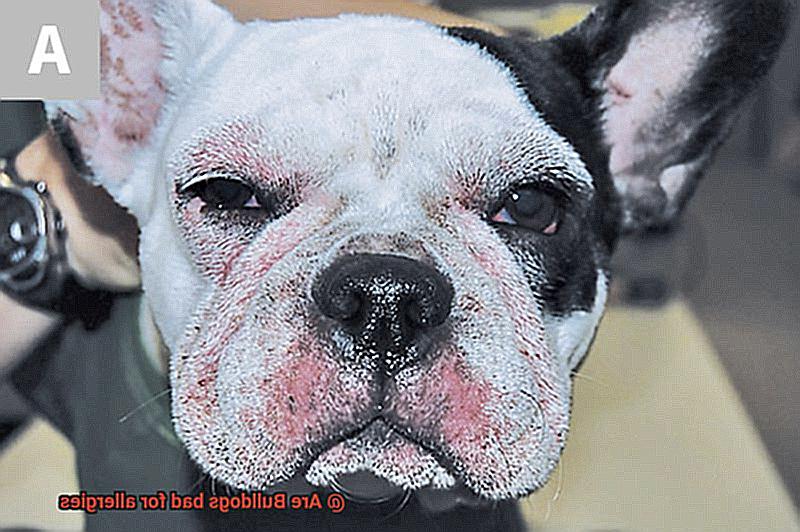Are Bulldogs bad for allergies?
Think Bulldogs and allergies don’t mix? Well, think again. These wrinkly-faced wonders have been unfairly judged when it comes to their compatibility with allergy-prone folks. But fear not, my friends, because I’m here to set the record straight.
So, are Bulldogs bad for allergies? This question has puzzled many a pet lover. While it’s true that Bulldogs can trigger allergic reactions in some people, let me tell you a little secret – no breed is completely hypoallergenic. Yup, you heard me right. Allergies are a complex beast influenced by various factors like individual sensitivities and specific allergens.
In this blog post extravaganza, we’re going deep into the Bulldog-allergy connection. We’ll unravel the misconceptions and arm you with knowledge so you can make informed decisions about bringing these lovable furballs into your home. Get ready to dive in and discover the real scoop on Bulldogs and allergies.
What Causes Allergic Reactions in Bulldogs?
Contents
- 1 What Causes Allergic Reactions in Bulldogs?
- 2 Are Bulldogs Hypoallergenic Dogs?
- 3 How to Minimize Allergenic Effects of Bulldogs
- 4 Different Symptoms of Allergic Reactions to Bulldogs
- 5 Understanding Individual Sensitivity to Allergens
- 6 Tips for Bulldog Owners with Allergies
- 7 Medications and Treatments for Managing Symptoms
- 8 Consulting a Healthcare Professional Before Getting a Bulldog
- 9 Conclusion
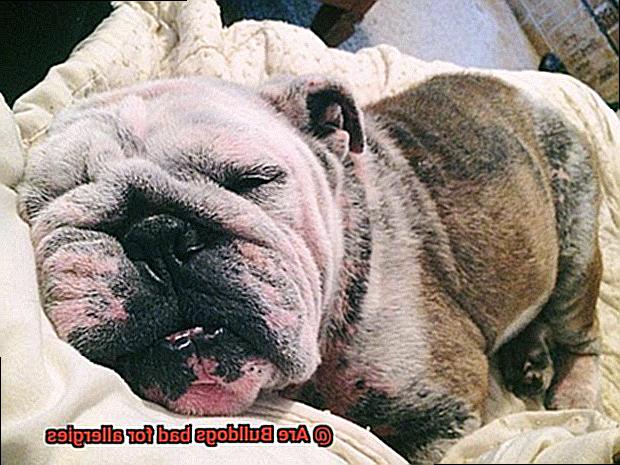
We all love our adorable furry friends, but it’s important to understand that Bulldogs, including French Bulldogs, can sometimes cause allergic reactions in sensitive individuals. In this article, we’ll dig deeper into the causes of these reactions and provide some tips for managing allergies while still enjoying the company of our beloved Bulldogs.
The Culprits: Dander, Saliva, and Urine
- Bulldogs produce proteins in their skin cells, saliva, and urine that can trigger allergic reactions.
- Can f 1 is a protein found in Bulldog dander (dead skin cells) that can become airborne and cause allergies when inhaled.
- Fel d 1, a protein found in Bulldog saliva, can also trigger allergies when it comes into contact with the skin or is inhaled.
- The proteins present in Bulldog urine can also cause skin reactions or respiratory symptoms.

Additional Allergens
- Bulldogs can carry common allergens like pollen, dust mites, or mold spores on their fur, which can worsen allergic reactions.
- Regular grooming and bathing can help reduce the amount of allergens present on their fur and skin.
- Using hypoallergenic shampoos and wipes specifically designed for dogs with allergies is recommended.
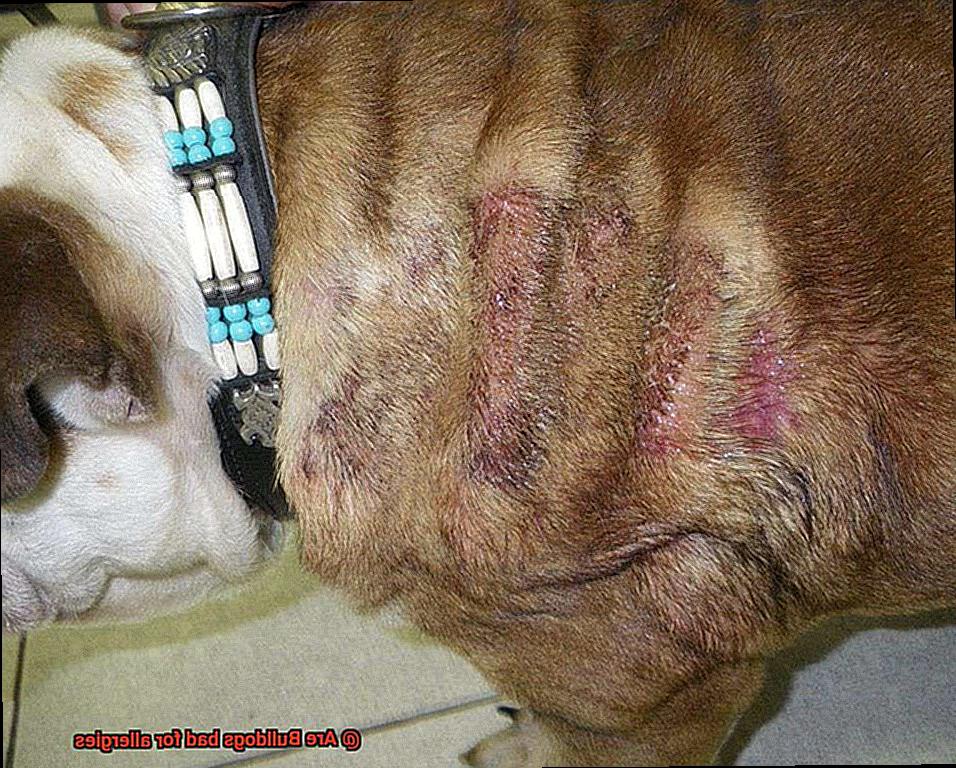
Personal Sensitivity Varies
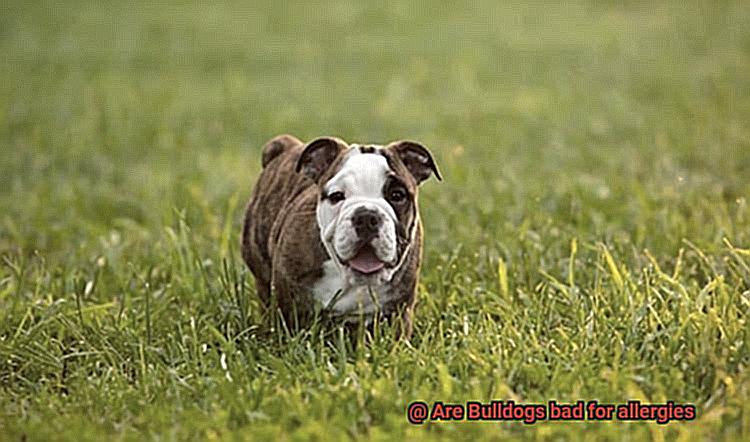
- Each individual has a different sensitivity to allergens, so while some may have no reaction to Bulldogs, others may experience severe symptoms.
- Spending time with Bulldogs before bringing one into your home allows you to assess your personal tolerance to their allergenic properties.
Managing Allergies
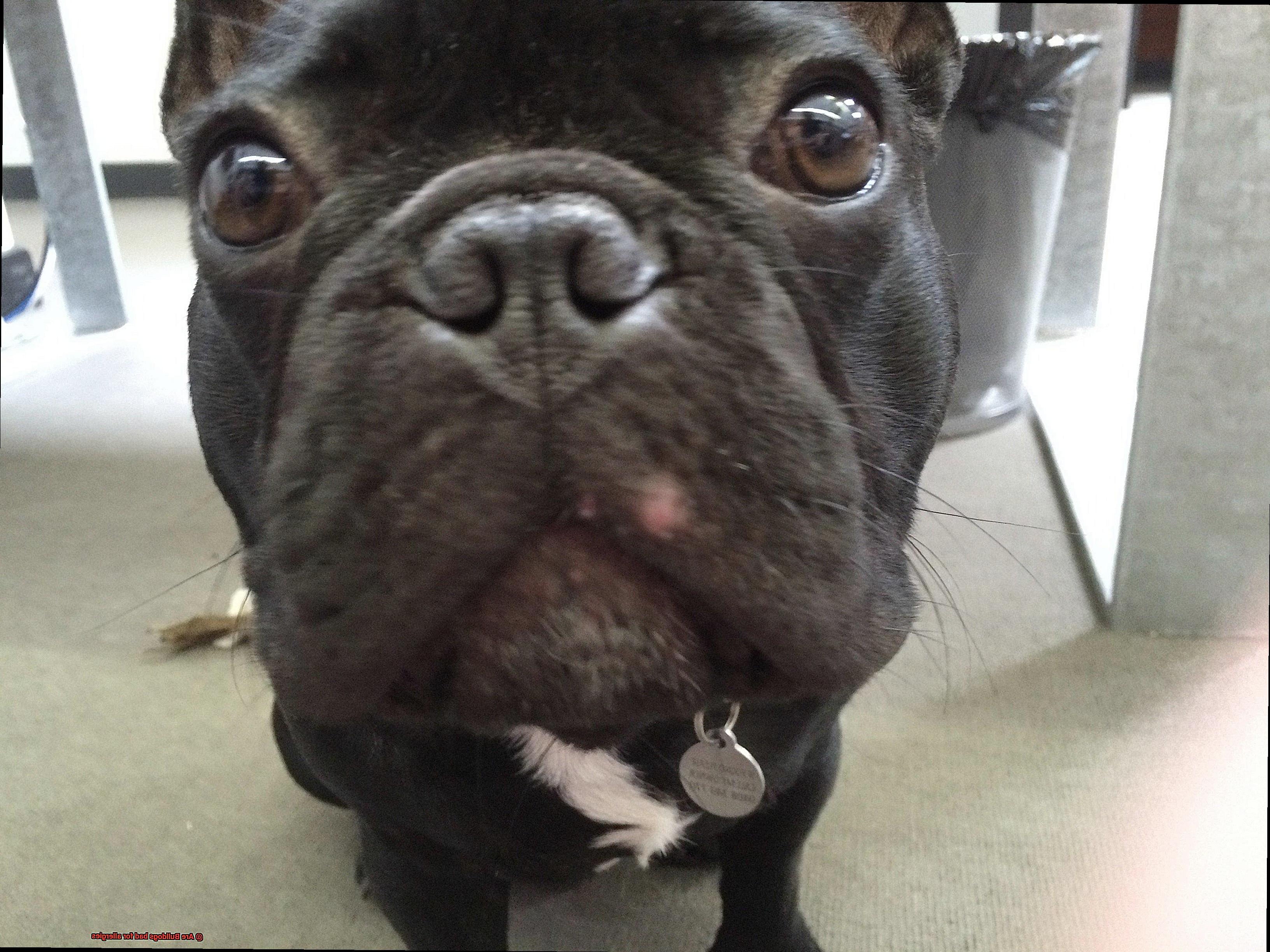
- Regular grooming and bathing of Bulldogs helps minimize allergens on their fur and skin.
- Keeping the home environment clean by vacuuming regularly, using air purifiers, and washing bedding frequently reduces exposure to allergens.
- Consultation with a healthcare professional or allergist is recommended for individuals with allergies considering getting a Bulldog. They can provide personalized advice and recommend appropriate measures to manage allergic reactions.
Are Bulldogs Hypoallergenic Dogs?

While Bulldogs are not considered hypoallergenic, there are factors to consider when it comes to allergies and these adorable pups. In this article, we’ll explore the truth behind Bulldogs and allergies, providing insights and tips for allergy sufferers who want to enjoy the company of these lovable companions.
Understanding Allergies and Bulldogs:
- Bulldogs have a short coat of fur, which can still produce dander, the main allergen in dogs.
- The Can f 1 protein found in their skin cells, saliva, and urine is responsible for triggering allergies.
- Different people may have varying reactions to Bulldogs, as allergies are highly individualized.

Managing Allergies with Bulldogs:
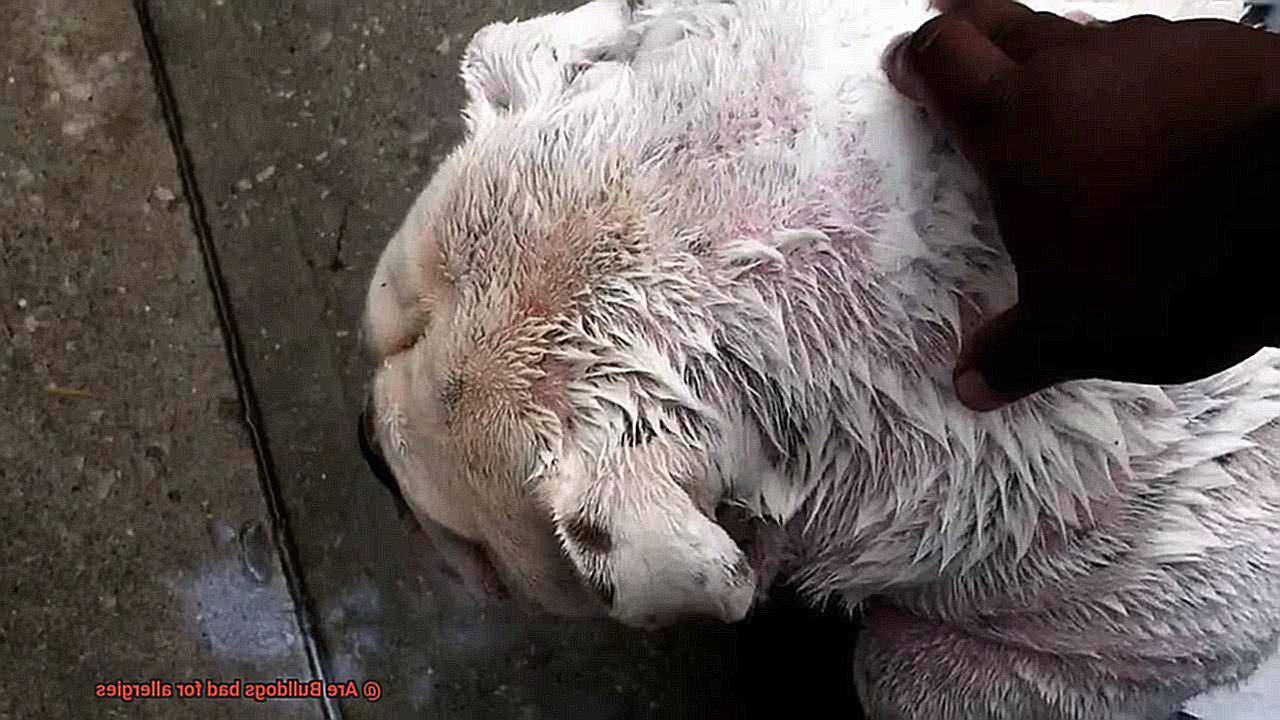
- Regular grooming and bathing can help reduce allergens on your Bulldog’s coat and skin.
- Be cautious not to over-bathe your Bulldog, as it can strip their skin of natural oils and potentially worsen allergies.
- Spend time with a Bulldog before bringing one into your home to assess your sensitivity.

Expert Advice on Allergies:
- Consult your healthcare provider or allergist for personalized advice on managing allergies around Bulldogs.
- Some breeders or rescue organizations may allow you to interact with Bulldogs to determine if they trigger allergic reactions.
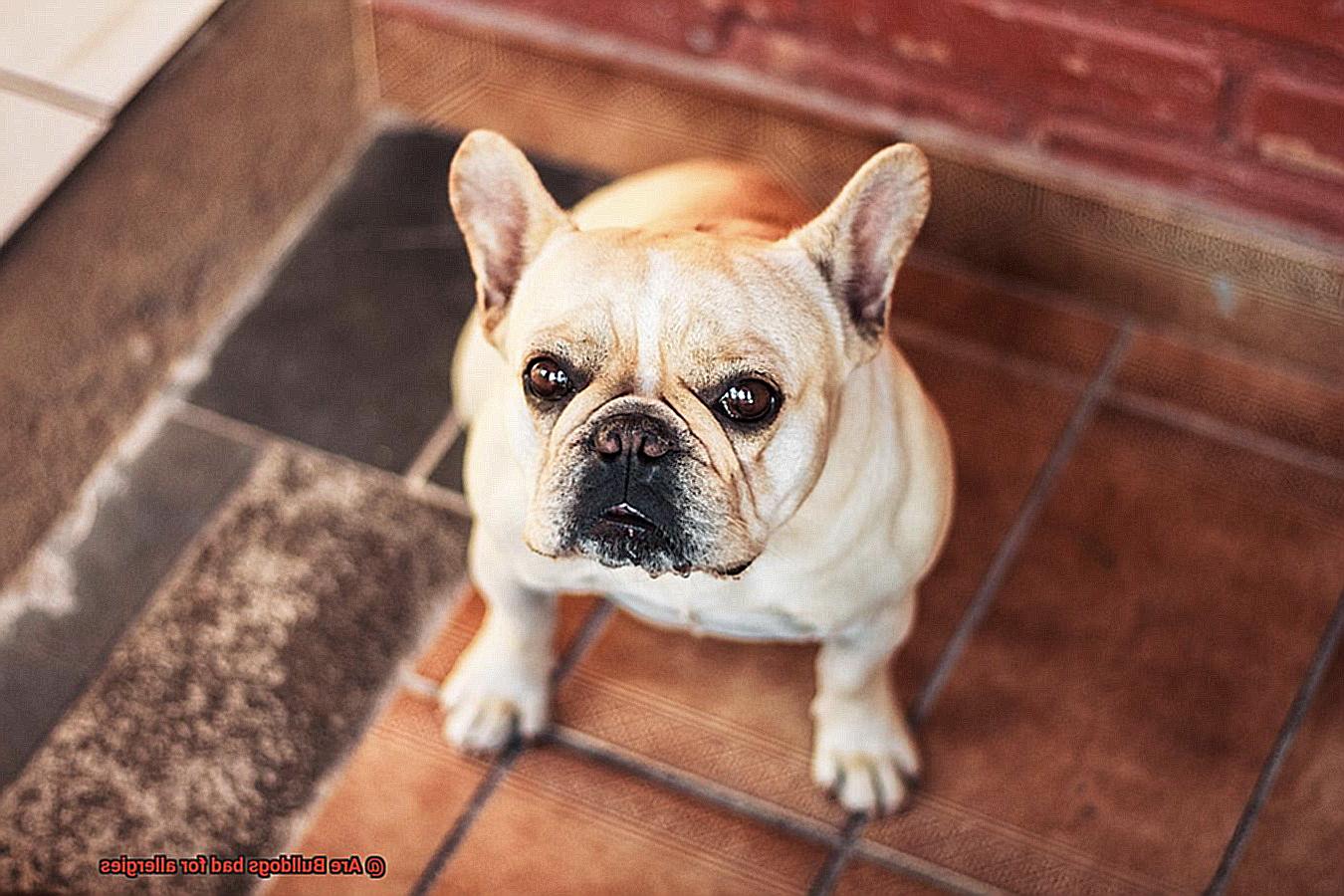
How to Minimize Allergenic Effects of Bulldogs
The lovable nature of Bulldogs can sometimes be overshadowed by the allergenic effects they may cause. However, fear not. In this comprehensive guide, we will explore effective ways to minimize the allergenic effects of Bulldogs, specifically targeting French Bulldog owners like you.
Regular Grooming: Keeping Allergens at Bay
Regular grooming is essential in reducing allergens. By brushing your French Bulldog’s coat frequently, you can remove loose hair and dander, significantly minimizing the amount of allergens in your home. Make it a bonding experience too, as Bulldogs usually enjoy being groomed.
Bathing to the Rescue:
Bathing your French Bulldog regularly can also help reduce allergens. Use a hypoallergenic shampoo and thoroughly rinse their coat to wash away any allergens that may be present. Remember to dry them thoroughly afterward to prevent skin irritation.
Clean Living Environment:
Maintaining a clean living environment is crucial in minimizing allergenic effects. Regularly vacuum carpets and upholstery, as well as dust surfaces, to remove pet dander and other allergens. Consider using a vacuum cleaner with a HEPA filter for optimal results.
Air Purification: Breathing Easier Indoors
Investing in a quality air purifier can significantly improve indoor air quality by capturing airborne allergens. Look for an air purifier with a HEPA filter, as it can effectively trap pet dander particles, ensuring cleaner air for you and your French Bulldog.
Designate Pet-Free Zones:
Creating pet-free zones in your home can provide relief for allergy sufferers. Keep your French Bulldog out of bedrooms or certain areas where allergic individuals spend a significant amount of time. This helps minimize their exposure to allergens and creates a safe space for allergy sufferers.
Medical Intervention:
For individuals with severe allergies, allergy medications or immunotherapy treatments prescribed by a healthcare professional can help manage symptoms caused by exposure to Bulldogs or other allergens. Consult with your healthcare provider for personalized advice and guidance.
Remember, while these measures can help minimize allergenic effects, they may not completely eliminate them. It’s advisable for individuals with severe allergies to spend time with Bulldogs before committing to owning one, to gauge their sensitivity.
Different Symptoms of Allergic Reactions to Bulldogs
These characteristics can also contribute to allergic reactions in some individuals. If you suspect that you or someone in your household may be allergic to Bulldogs, it’s important to be aware of the different symptoms that can arise. In this section, we’ll explore the various symptoms of allergic reactions to Bulldogs.
Skin Irritation:

One common symptom of allergic reactions to Bulldogs is skin irritation. People who are allergic may experience redness, itching, and rashes when they come into contact with a Bulldog’s saliva, dander, or urine. These symptoms can be particularly problematic for individuals with sensitive skin or pre-existing skin conditions.
Respiratory Issues:
Bulldogs are brachycephalic breeds, meaning they have short and flat noses. This can lead to breathing difficulties not only for the dogs themselves but also for allergy sufferers. When allergens from Bulldogs are inhaled, they can trigger nasal congestion, sneezing, coughing, wheezing, and even asthma attacks in some cases.
Eye-related symptoms are also common among people with allergies to Bulldogs. Contact with the allergens can cause redness, itching, swelling, and watering of the eyes. Some individuals may also experience a gritty or burning sensation in their eyes as a result of the allergic reaction.
Digestive Issues:
Allergic reactions to Bulldogs can also manifest as digestive issues. Ingesting allergens from the dog’s dander or saliva can lead to gastrointestinal symptoms such as nausea, vomiting, diarrhea, and stomach cramps. These symptoms may be more pronounced in individuals with underlying digestive sensitivities or conditions.
Anaphylaxis:
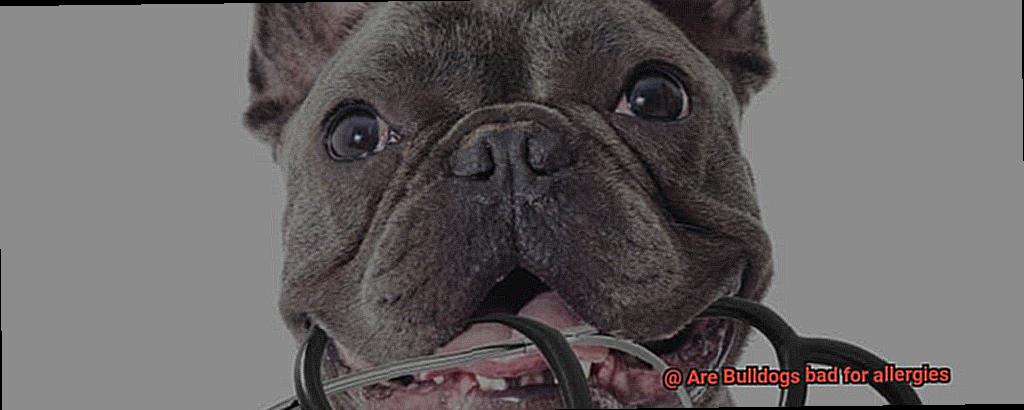
In severe cases, an allergic reaction to Bulldogs can result in anaphylaxis. Anaphylaxis is a life-threatening allergic reaction that requires immediate medical attention. Symptoms include difficulty breathing, rapid heartbeat, low blood pressure, hives or rash all over the body, swelling of the face and throat, and loss of consciousness. If someone experiences these symptoms after exposure to Bulldogs or any other allergen, emergency medical assistance should be sought immediately.
It’s important to note that the severity of allergic reactions can vary from person to person. Some individuals may only experience mild symptoms, while others may have more severe reactions. If you suspect you or someone in your household is allergic to Bulldogs, it is recommended to consult with an allergist or immunologist for proper diagnosis and guidance on managing the allergies effectively.
Understanding Individual Sensitivity to Allergens
Understanding individual sensitivity to allergens is crucial in managing allergies effectively. In this blog post, we’ll explore why individual sensitivity varies and provide practical steps to reduce allergen exposure for French Bulldog allergy sufferers.
Why does individual sensitivity to allergens vary?
- Immune system response: Allergies occur when the immune system overreacts to normally harmless substances. The degree of reaction varies from person to person.
- Breed-specific factors: While Bulldogs, including French Bulldogs, are not inherently bad for allergies, some individuals may be allergic to specific proteins found in their saliva, urine, or dander.
- Other allergen sources: Individuals may mistakenly attribute their allergies to Bulldogs when they are actually sensitive to other common allergens like dust mites or pollen brought in from outside.
Determining individual sensitivities:
- Spend time around Bulldogs: Before committing to owning a French Bulldog, spend time around them to assess your specific sensitivity. This will help determine if you are specifically allergic to the breed or if other factors trigger your allergies.
- Allergy testing: Consult an allergist for comprehensive allergy testing. This can identify specific sensitivities, helping you understand if you are allergic to proteins found in Bulldogs or other common allergens.
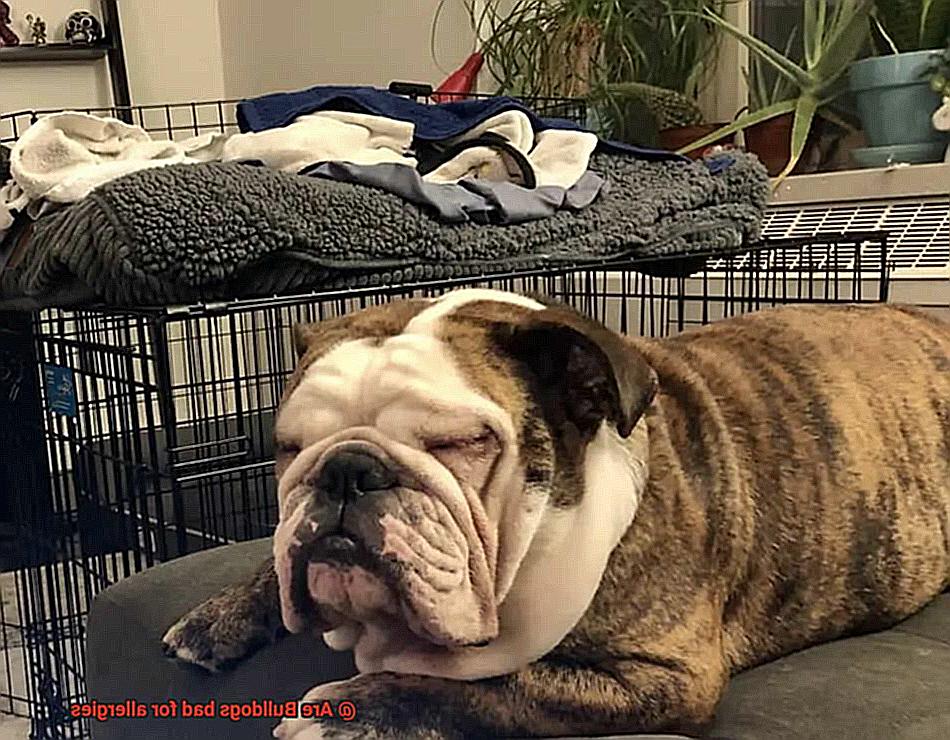
Reducing allergen exposure for French Bulldog allergy sufferers:
- Regular grooming and washing: Regularly groom and wash your French Bulldog to minimize dander levels. Use hypoallergenic shampoos recommended by your veterinarian to reduce potential allergens.
- HEPA filters: Install high-efficiency particulate air (HEPA) filters in your home’s HVAC system. These filters can help capture airborne allergens, including pet dander.
- Maintain a clean home environment: Vacuum frequently using a vacuum cleaner equipped with a HEPA filter. Wash bedding, curtains, and other fabrics regularly to remove allergens.
- Restricted areas: Designate certain areas of your home as “pet-free zones” to minimize allergen exposure in specific areas, such as bedrooms or living spaces where you spend the most time.
- Air purification: Consider using standalone air purifiers with HEPA filters in rooms where you spend significant time to further reduce airborne allergens.
Tips for Bulldog Owners with Allergies
Fear not. In this article, we’ll share some helpful tips and strategies for Bulldog owners with allergies. With a little extra care and attention, you can minimize your exposure to allergens and still have a happy and healthy relationship with your furry friend.
Keeping Your Bulldog Clean and Well-Groomed:
Regular bathing and brushing are essential for reducing allergens like dander and pollen on your Bulldog’s coat. Use a hypoallergenic shampoo designed for sensitive skin and brush their coat frequently to minimize shedding and the spread of allergens.
Establishing an Allergy-Free Zone:
Create a designated “allergy-free” space in your home where your Bulldog is not allowed to enter. Keep this area clean and free from any dog-related allergens. This will provide you with a safe haven where you can retreat if your allergies are acting up.
Investing in an Air Purifier:
Consider getting a high-quality air purifier with a HEPA filter specifically designed for pet allergies. This will help filter out allergens like pet dander, pollen, and dust from the air, improving indoor air quality and reducing allergen exposure.
Keeping Your Home Clean:
Regularly vacuum carpets, rugs, and upholstery to remove pet hair and dander that may trigger allergic reactions. Use a vacuum cleaner with a HEPA filter for efficient removal of allergens. Wash your Bulldog’s bedding frequently in hot water to eliminate allergens.
Personal Hygiene:
Wash your hands thoroughly after handling your Bulldog to prevent allergens from spreading to your face and eyes. Avoid touching your face while interacting with your pup, and consider wearing a mask while grooming or cleaning up after them.
Consult with an Allergist or Immunologist:
If your allergies are severe or unmanageable, it’s a good idea to seek professional advice. An allergist or immunologist can provide personalized advice and treatment options to help alleviate your symptoms. They may recommend allergy medications, immunotherapy, or other interventions based on the severity of your allergies.
Medications and Treatments for Managing Symptoms
Fortunately, there are various medications and treatments available to help manage these allergies and allow you to enjoy the company of your furry friend. In this article, we will explore the different options that can provide relief from allergy symptoms caused by French Bulldogs.
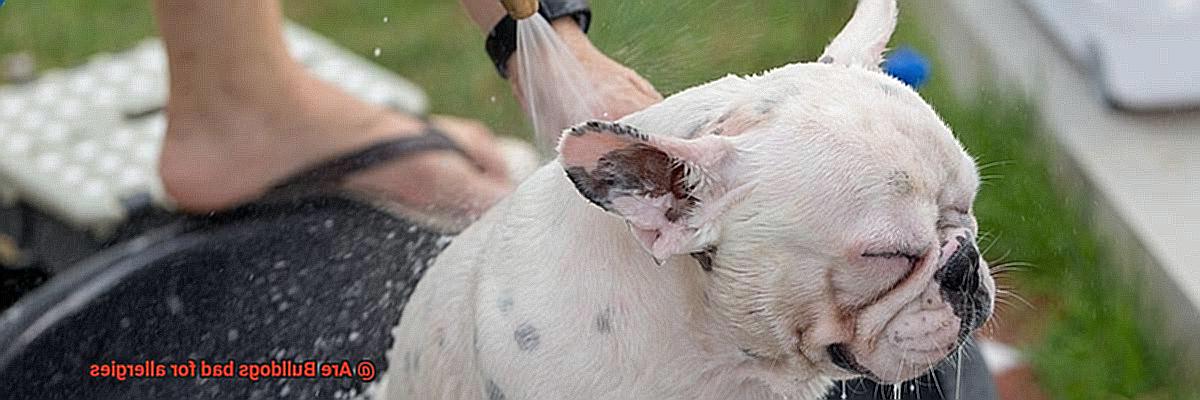
Antihistamines:
Antihistamines are widely used to alleviate allergy symptoms such as sneezing, itching, and a runny nose. Over-the-counter options like cetirizine (Zyrtec), loratadine (Claritin), and fexofenadine (Allegra) are readily available. For more severe symptoms, prescription antihistamines like desloratadine (Clarinex) or levocetirizine (Xyzal) may be recommended.
Nasal Corticosteroids:
Nasal corticosteroid sprays can effectively reduce inflammation in the nasal passages, helping with congestion, sneezing, and itching. Popular options include fluticasone (Flonase), mometasone (Nasonex), and budesonide (Rhinocort).
Decongestants:
Decongestants can provide temporary relief from nasal congestion caused by allergies. However, they should be used cautiously due to potential side effects such as increased heart rate or elevated blood pressure. Common decongestants include pseudoephedrine (Sudafed) and phenylephrine (Neo-Synephrine).
Immunotherapy (Allergy Shots):
For individuals with severe allergies, immunotherapy may be recommended. This treatment involves regular injections of small amounts of allergens over time to desensitize the immune system. Allergy shots can significantly reduce symptoms and improve overall quality of life in the long term.
Self-Care Measures:
In addition to medications, adopting self-care measures can help minimize exposure to allergens. Regularly cleaning your home to remove pet dander, using air purifiers or filters, keeping your French Bulldog out of bedrooms or off furniture, and wearing a mask while grooming or cleaning up after your pet can make a big difference in managing allergy symptoms.
Consulting a Healthcare Professional Before Getting a Bulldog
You’ve fallen in love with the adorable French Bulldog, but there’s just one problem – allergies. Before you let disappointment set in, it’s important to consult a healthcare professional who can help you navigate this situation. In this blog post, we’ll explore why consulting a healthcare professional is crucial before getting a Bulldog, especially for individuals with allergies.
Understanding Your Allergies:
Allergies can be triggered by various factors, including pet dander, saliva, urine, and even the skin of the animal. Consulting a healthcare professional who specializes in allergies is essential to determine if you are allergic to these potential allergens. They can conduct tests to identify specific triggers and guide you on how to manage your allergies effectively.
Breathing Difficulties:
French Bulldogs, like other brachycephalic breeds, are prone to breathing difficulties due to their shorter nasal passages and elongated soft palates. These breathing issues can exacerbate allergies for individuals, as the dog’s respiratory system may produce more allergens due to reduced airflow. A healthcare professional can help assess the impact of these breathing problems on your allergies and overall health.
Controlling Allergens:
If you’re determined to get a Bulldog despite potential allergies, there are steps you can take to minimize exposure to allergens. Regular grooming and bathing of your furry friend can reduce dander and other allergens on their fur. Additionally, using air purifiers and frequently vacuuming your home can help remove allergens from the environment. However, it’s important to note that these measures may not completely eliminate the risk of allergic reactions.
Allergy Management Strategies:
In some cases, healthcare professionals may recommend allergy management strategies such as medication or immunotherapy. Antihistamines or nasal sprays can provide relief from allergy symptoms caused by pet allergens. Immunotherapy, on the other hand, can help desensitize individuals to specific allergens over time. These options should be discussed with a healthcare professional to determine if they are suitable for your specific allergies.
Considering Alternative Breeds:
If Bulldogs are not suitable for your allergies, don’t worry. There are alternative breeds known to be hypoallergenic, producing fewer allergens and being better suited for individuals with allergies. However, it’s crucial to consult with a healthcare professional before bringing any pet into your home to ensure it’s a safe and suitable choice for you.
rkBoMhDG4hI” >
Conclusion
In conclusion, Bulldogs can be a challenging choice for individuals with allergies.
Their short, dense coats may harbor allergens such as dander and saliva, which can trigger allergic reactions. Furthermore, Bulldogs are known to drool excessively, adding another potential source of irritation for allergy sufferers.
Consulting with an allergist and spending time with Bulldogs in advance can provide valuable insights into their compatibility with allergies.
